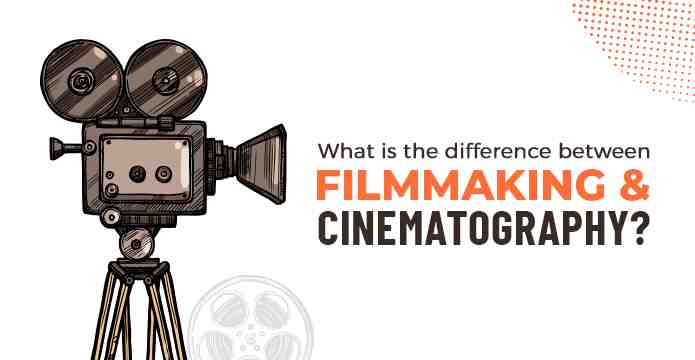Filmmaking is an art, whereas Cinematography is a technique. In the entertainment industry, both the art and technique are collectively executed for obtaining the desired outcome in a film or a movie. So, it’s reasonable to say that filmmaking and cinematography is a process
that ideally unfolds the overall expression of the narrative in the silver screen.
Behind a successful film, there is always a group of crew, striving to accomplish the envisioned result. Along with the crew, the major element concerned in a good film includes the method of its conception and the overall strategy. Thus, here is exactly when the role of a filmmaker and cinematographer involves the most. In this blog, we will address the difference between Filmmaking and Cinematography so that you can get a precise perspective on the same.
If Film Is Narrative, Lens Is The Perception Of Narrative
Filmmaking is more like storytelling. Cinematography, on the contrary, is a medium through which the verbal and visual depiction of storytelling is accomplished. A Filmmaker stands as the mind behind the storytelling and a Cinematographer as the vision behind the lens.
The majority think that the director is the chief individual behind the overall representation of a film. However, filmmakers and cinematographers work mutually for the one and same vision for a film. It’s just that the nature of their responsibilities differs for the same purpose. A filmmaker produces and directs films or movies. Whereas a cinematographer handles the camera operation and controls the lighting effects in the lens during the making of a film.
Responsibilities Of A Filmmaker & A Cinematographer
Filmmakers, movie directors, and producers determine the characteristics and layout of a film during the making of a movie. On the other hand, Cinematographers translates the vision of a filmmaker into a virtual reality by filming every element required in the movie. He further ensures that each shot is effective and satisfies the desired result.
Besides, it is also crucial to understand that filmmakers and cinematographers work simultaneously alongside the producer, who gives ideas to the director. The director then instructs the cinematographer who works as per the given instruction. Filmmakers and cinematographers are responsible for settling costumes, film sets, lighting, sound effects ideal for each scene.
Both filmmaker and cinematographer create engaging films for both small and big screens. However, the focus of the filmmakers is likely to be a bit huge as compared to the cinematography. The obvious reason being that the filmmaking involves producing, direction, including direction and small details concerning the layout and tone of the film.
Cinematographers, on the other hand, are particularly responsible for the camera operation or camera work, and the effective capturing and shooting of the purposed movie. A cinematographer’s responsibility is unquestionably significant. For, it’s not an easy task to comprehend and summarize the responsibilities that involve ensuring the perfect shot as envisioned by the director, the ideal lighting effects, and that the aesthetics of the film are perfectly correlated.
A cinematographer is also called as the director of photography. And the responsibilities often include instructing the camera operators as per the director’s wishes. The overall task is complex, due to which, the cinematography remains as an impressive yet arduous profession.
Filmmaking Vs. Cinematography At A Glance
Filmmakers: Filmmakers, directors, producers direct a filming project by managing every element. Producers finance money or raise funds for the project. He also appoints directors who instruct the entire cast members to make them perform well-defined impression for the film.
A filmmaking project starts with filmmakers approving the script and confirming on schedules and resources. As they determine the summary of the script, they also audition artists to get the most suitable fit. From lighting to music, costuming to dialogues, filmmakers determine and approve every detail in a film. They even have their final say on the editing the clips, adding sound effects, etc.
Job responsibilities of a filmmaker:
1. Managing the sets and scenery and ensure they suit the ambiance
2. Working with cinematographers to draft shots
3. Allowing spending by all departments
4. Endorsing the movie through radio and television conferences.
Cinematographers: Cinematographers work mutually with filmmakers and assistant directors. They are responsible for shooting the film on camera. Additional responsibility entails picking the best devices. Cinematographers pick film, cameras, tracks, tripods, and lighting for capturing the movie. Furthermore, they should travel to a suggested shooting location before the time to determine what equipment is required.
Cinematographers also sketch a shot list depending on the script and schedule. Thereafter, they speak with the filmmaker to plan the actual shooting.
While filming a scene, Cinematographers determine the shot angle and relocate the lighting to communicate the mood of the film and ideally capture the theme of the shot.
Job responsibilities of a cinematographer:
1. Determining aesthetic preferences for the film, including color determination, focus, lighting, etc.
2. Enduring clamps and additional camera operators
3. Arranging shots to the plot of the script
4. Creating lighting to set the environment and time of day.
Also Read: How to start a career in filmmaking?









